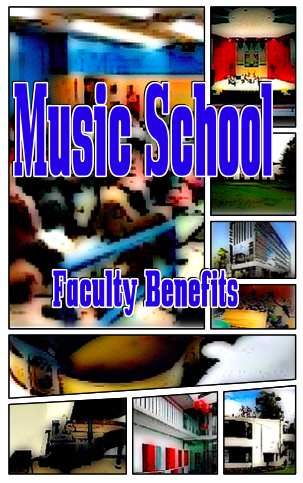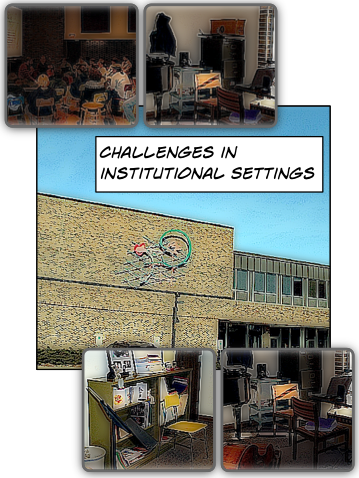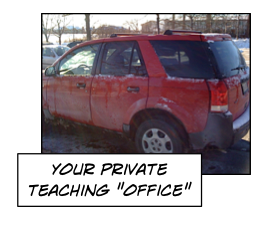This is part two of a blog series. Read part 1 here.
__________
My current teaching studio is 100% free of any institutional affiliation, though it certainly wasn’t always that way. For teachers on faculty at a major music school, being on faculty is a no-brainer, but for folks like me who end up as adjunct faculty a third-tier institutions or community music schools, this is an important consideration. Here are some pros and cons to being on faculty at one of the latter sort of schools (I’m not talking about Juilliard here!) versus being a free agent teacher like me:
Music School Faculty Pros & Cons
Pros:
1. Affiliation with recognized institution – There’s a certain cache to having an institutional affiliation. Think about it–when someone appears on National Public Radio, they are always referred to as “_______ of the Brookings Institute” or “_______ of Harvard Law”, not just plain old Joe Schmo. Having your name associated with a recognized organization lets people know that at least someone thinks you know something, and it gives some weight to your words.
2. Teaching studio space – Having a space to call your own is key to teaching. Even a shared studio space (like I had in my various adjunct university jobs) gives you a place to put your materials. This one little creature comfort–having your own space–makes a huge difference.
3. Facility for recitals – After leaving university music programs, man students are startled to realize that there is no longer a space (or a reason!) for solo recitals. Being on faculty at a music school gives performers both a space to play in and a reason to work up a recital.
4. Grades and other assessment tools – The ability to slap a grade on a student is a great motivating factor if handled correctly. In addition to tying student achievement to a letter grade, having juries at the end of each semester is a great focal point for work and provides a concrete goal for practicing. As a private teacher, you have to work a little harder to provide structured assessment moments like juries for your students.
5. You get paid if they skip lessons! – Music school students have almost always paid for an entire semester of lessons. If they skip, they still pay. If you’re a private teacher, the onus is on you to collect money for students who skip. This can be difficult. Having a system in place for this situation from an institution can be a very good thing for the lesson teacher.
6. Institutional structure can help to organize the lesson experience – It feels weird to hand out syllabus to private students, but it’s often expected in a college or community music school setting. Having clear expectations set out for both student and teacher can help to keep things organized.
Cons:
1. Small/cramped/overcrowded facilities – Though you’ll certainly get some sort of space to teach in, it may be horrific. You’d be amazed at some of the hared teaching studios I’ve been crammed in over the years. I’d oftentimes have done better setting up shop out in the hall!
– Though you’ll certainly get some sort of space to teach in, it may be horrific. You’d be amazed at some of the hared teaching studios I’ve been crammed in over the years. I’d oftentimes have done better setting up shop out in the hall!
2. Having to make up lessons – Have a 14 service week of rehearsals and performances. You can certainly cancel your lessons…but you’ll have to make them up at some point. Gigging musicians frequently get themselves into a pickle during busy times by having to cancel or reschedule lessons, a factor that doesn’t really exist if you have a private studio. These days, if I have a crazy week, I just cancel lessons, picking back up when things settle down for me.
3. You often has to take a particular student regardless of whether it’s a good fit – One of my favorite things about being a private teacher is getting to choose my students rather than have them handed to me. For me, this results in a more engaged body of students, making for a more enjoyable teaching experience for me.
4. Less money – Community music schools often pay their teachers only a fraction of what the student actually pays for lessons–sometimes less than half of the total cost! Universities tend to not do this, but their pay rates tend to be static for prolonged periods of time, resulting in significantly lower wages than private teachers take home.
5. Stagnant pay rates – Not only are teachers generally paid less in institutional settings, but they tend to remain at the same base pay level for three, four, five or more years. Factor inflation into the mix and teachers end up making less and less each year, only occasionally receiving a bump in pay.
6. Limited ability to raise rates – This ties into the former points (see a lot of monetary negatives on this list?). Doing a great job rarely results in a pay raise in institutional settings. When gas prices spike or other sudden costs arise, the teacher generally has to ear the brunt of this cost. Extenuating circumstances are not usually met with adjustments in pay. As a teacher, you have to suck it up or quit.
7. Have to juggle shares teaching spaces with other faculty – Only free on Tuesdays? Tough. If there’s no space, you ain’t teaching. Scheduling scattered adjunct faculty members into limited studio space can be a real nightmare, and you may find yourself in an incredibly annoying juggling act with studio space. Trust me–I’ve been there (and will blog about it soon).
8. Have to rely on the facility being open – While you can easily teach during the summer or on holiday breaks as a private teacher, you might be locked out of your institution for breaks.
Free Agent Teacher Pros & Cons
Pros:
1. You are in control – As a free agent teacher, you are in control of all the details of your career. You choose your own rates, hours, and lesson policies, and you are your own boss.
2. You take home more money – You take home 100% of your lesson rates as a private teacher, as compared to 50% or even less in many community music schools. Your rates usually go up while our students pay the same or even less than they had been paying–a good deal for both parties!
3. You pick the students you want to teach – Do you have a student that you just don’t get along with? As a private teacher, you can just say “see ya” and move on to another student. As your reputation improves and you become more in demand, you get to cherry pick your students even more, resulting in a high quality of student and an incentive for your students to practice (they either practice or make way for students that will).
4. Flexible and adaptable schedule – Many private teachers juggle their student load with gigs and family commitments. Not being locked into a specific number of lessons per semester on specific days of the week can be a huge plus for a busy modern lifestyle.
Cons:
1. Responsible for self-employment tax – This is a big sticking point for many teachers and can be a real problem if you don’t intelligently handle your student income.
2. Must find your own teaching space – If you have a house that is set up well for teaching, then this isn’t an issue–have students come to you! If, like me, you don’t have a good home teaching set up, you have to get creative.
3. No reputation = no students – Quite frankly, there is no reason for students to study with you unless you’ve already got a reputation–a bad situation for newer teachers, and one major reason to go with a community music school if you’re just starting out. One word of warning: if you start teaching at a community music school with designs of eventually moving out on your own, you should know that many music schools make you sign a form stating that you will not “poach” their students. Many private teachers ignore this clause, but you can get into some real trouble if you decide to take this approach (one that I’ve always avoided–no poaching for Jason).
4. Responsible for atttracting students, promoting studio – When you teach at a community music school, the onus is theoretically on them to help recruit for you (though this may not happen in actual practice). At the very least, many people will head to a local music school when looking for lessons, so unless you are already a known entity in a particular community, you may find it extremely difficult to get students. Therefore, you’ll have to do some legwork on our own. This can take the form of networking with local public school teachers and youth orchestras, advertising in local publications or online, and generally being aggressive in getting your name out there. This is not for all tastes.
5. Organizational nightmare – Free agent private teaching requires good organizational skills–something that musicians are not typically known to possess! You have to juggle many different schedules, handle finances, and promote yourself effectively, which may or may not fit with your personality.
Further Free Agent Challenges
If you don’t already have a reputation as a teacher, or course, it is extremely challenging to be unaffiliated with a music school. You’ve got to have some “paper” behind you, and your pricy music school degrees are only a little bit of the equation.
If (like me) you aren’t into self-promotion, you may want to stick with a community music school that will do much of the recruiting for you. When looking for a teacher, a high percentage of people simply go to “Music School x” and ask for a violin teacher, a cello teacher, or a piano teacher. Think about the kind of marketing you’d have to do on your own to compete with that!
My students come via word-of-mouth, which takes time to build. I suspect that most other private studios function the same way.
Your Experiences
What kind of teacher are you? Why? Do you do a lot of recruiting? What is your ideal teaching setup? Let us know!
Bass News Right To Your Inbox!
Subscribe to get our weekly newsletter covering the double bass world.

Hi – I appreciate this blog – a community college has recently offered me an Adjunct Faculty position for 2010/11 – this has helped me make up my mind 🙂 THANKS!